By ATOM ARAULLO
AUGUST 14, 2018
TWO HOURS DRIVE FROM METRO MANILA, the sprawling plantations of Nasugbu, Batangas offer an idyllic scene of bucolic life. Here, row upon row of sugarcane flutters under the shadow of Mt.Talamitam. There, columns of mango trees divide the plots into neat geometrical shapes. In the distance, a farmer is carrying something heavy on his shoulder. Nearby, a carabao disappears in a pool of mud.
It is a verdant paradise for passing eyes, but a prison without walls for the farm workers who call this place home.
Rodelson “Oro” Silang has known nothing but life in these unforgiving fields. The 21-year-old has a lot of work ahead of him today. Weeds have overtaken two hectares of newly-planted sugarcane and the land needs to be cleaned up for the crops to mature. All of this has to be accomplished assiduously by hand.
Oro takes a deep breath, then heaves an anguished sigh.
“Tiyak na mapapasabak na naman,” Oro says. “Putok-putok ang kamay mo diyan.”
(“It’s going to be tough. Our hands will surely get busted up.”)
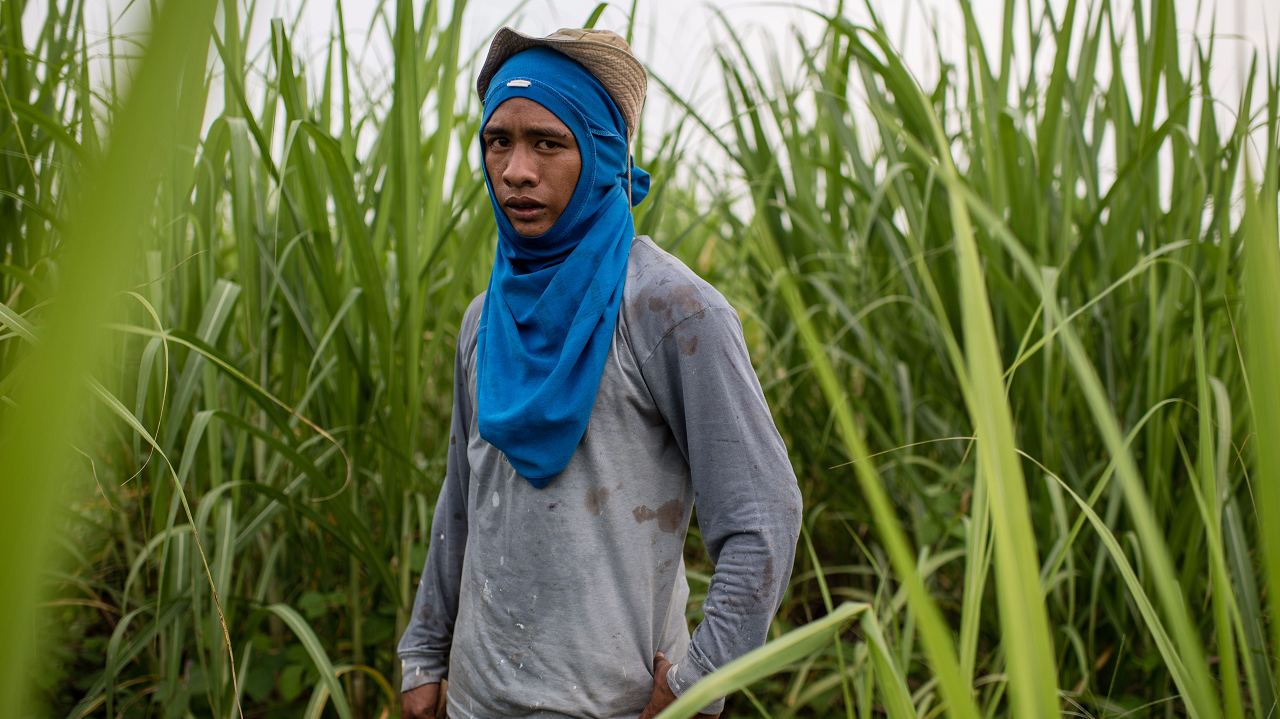
Oro has chestnut eyes and a trendy haircut, short at the sides and long up top, which he parts neatly to left when he wants to look sharp. The hair goes well with his livery at the Batangas State University, where he is a sophomore studying criminology. He has a somewhat athletic build, a result of his boxing scholarship for the school. One day, he dreams of becoming a national champion.
Joining him in the plantation is his 18-year old cousin Christopher, nicknamed “Toper”, who has a constant look of mischief on his face. He says he likes it when he gets to work alongside Oro, who he considers an older brother.
“Kasi nakakapagod din dito kung nag-iisip mag-isa. Maganda yung kwento lang nang kwento,” Toper says.
(“It’s just tiring to be alone with your thoughts out here. It’s nice to share stories with someone.”)
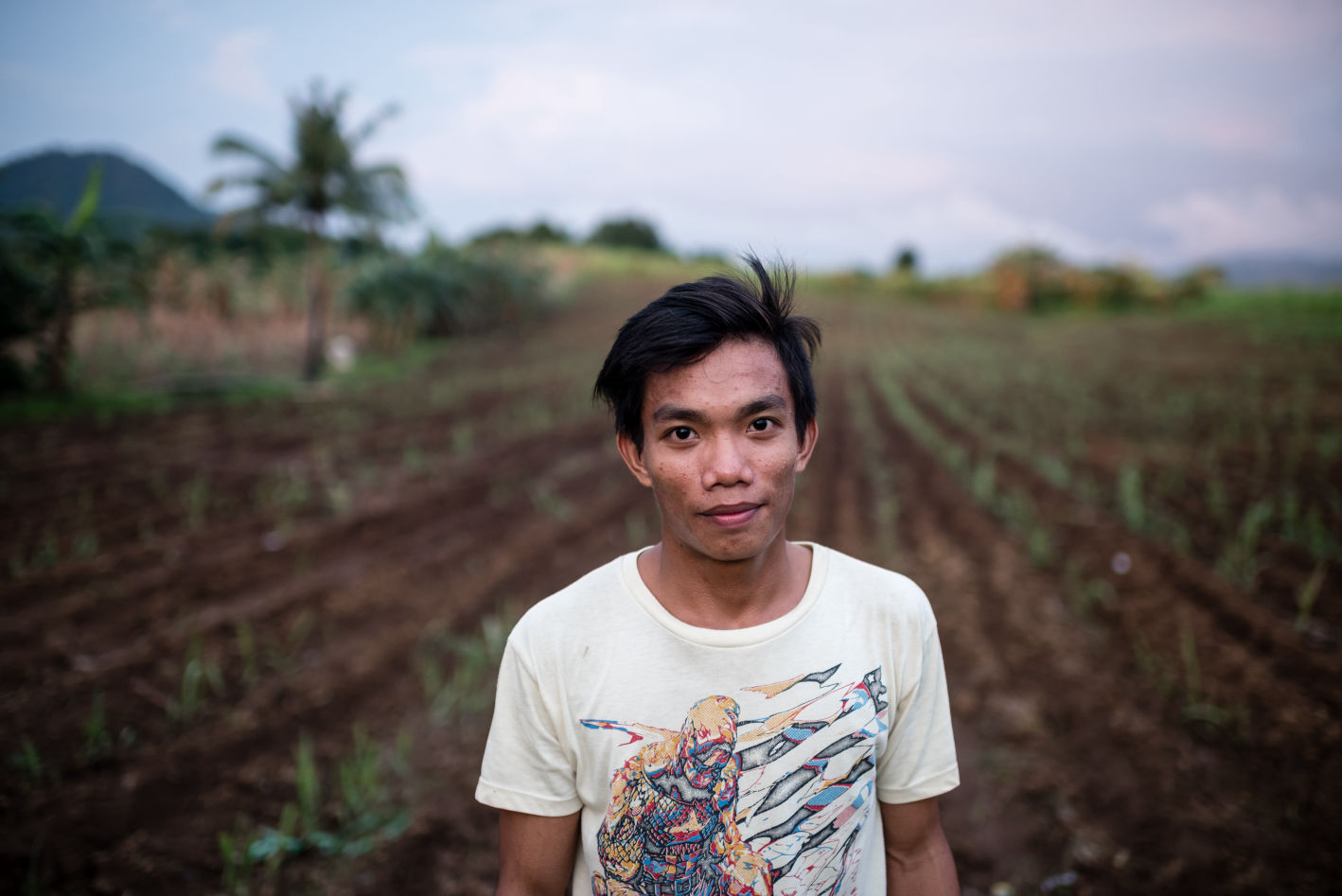
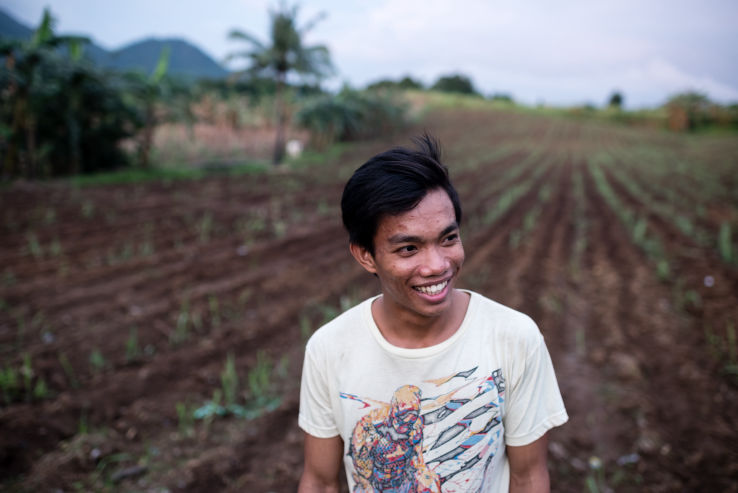
Toper has a wiry physique, which is quite typical of farm workers here, as if their bodies were only allowed to pack the bare minimum for the back-breaking slog in the fields. He is in Grade 12 at Nasugbu East Elementary School, where he will raise his hand tomorrow to recite in his computer ethics class.
None of that matters now. Today, Oro and Toper and the rest of the farm workers sharpen their scythes, seal up the ankles of their trousers, share orphaned gloves, and cover up their faces with ragged t-shirts. Soon enough, everyone looks the same, a faceless squad assembled for a single purpose.
THE WORK IS PUNISHING the motions repetitive, the heat relentless. As the group toils under gray skies, a towering plume of smoke rises on the horizon.
It is the Central Azucarera de Don Pedro, where most of the sugarcane from the surrounding haciendas will be processed into sugar. Deeper into the plantation, the tall grass envelops the workers, hiding them from sight, and what’s left is the percussion of busy footsteps and the chop, chop, chop of swinging blades.
Every now and then, a song would float in the air, the voices behind it, rather good. A theory just then: maybe this is why there is so much singing talent in the Philippines, with more than half the population living in the countryside. It takes less than a minute for the novelty of the idea to evaporate.
IT WILL TAKE AROUND FIVE DAYS for this group to finish the job, which is good news for the workers. This late in June, every extra day of work in the fields is precious. Tiempo Muerto, the dead season, is just around the corner, an annual ritual of penury and sacrifice. For five to seven months, labor in the plantation slows down or grinds to a halt as the newly-planted sugarcane grows. The income of contractual farm workers plummets.
This time of year always fills Conrado Silang, Toper’s father, with dread. To survive Tiempo Muerto, farmers like him have to look elsewhere to earn a living. With seven children still under his roof, Conrado is feeling the pressure.
“Mawawalan na kami ng trabahong ganito, kaya magpuputol na kami ng ganiyang mga kahoy, uulingin namin yan, 'yun ang aming hanapbuhay. 'Pag talagang walang wala na, eh 'di maghahanap kami kung saan may construction naman. Kaya lang ngayon hindi na ako pupwede dahil 48 na ako, kailangan 40 pababa,” Conrado says. “Talagang nadaos ang krisis sa amin, kami nakain na lang minsan ng lugaw para lang 'di masyadong magutom ang mga bata.”
(“There won’t be any work in the fields, so we’ll have to start collecting wood to turn into charcoal. That will be our source on income. If that’s not enough, we can look for work in construction. But they won’t accept me anymore, I’m already 48, and they need people 40 and below. It’s really a time of crisis. Sometimes, we'd just have rice porridge, just so the kids wouldn’t be so hungry.”)
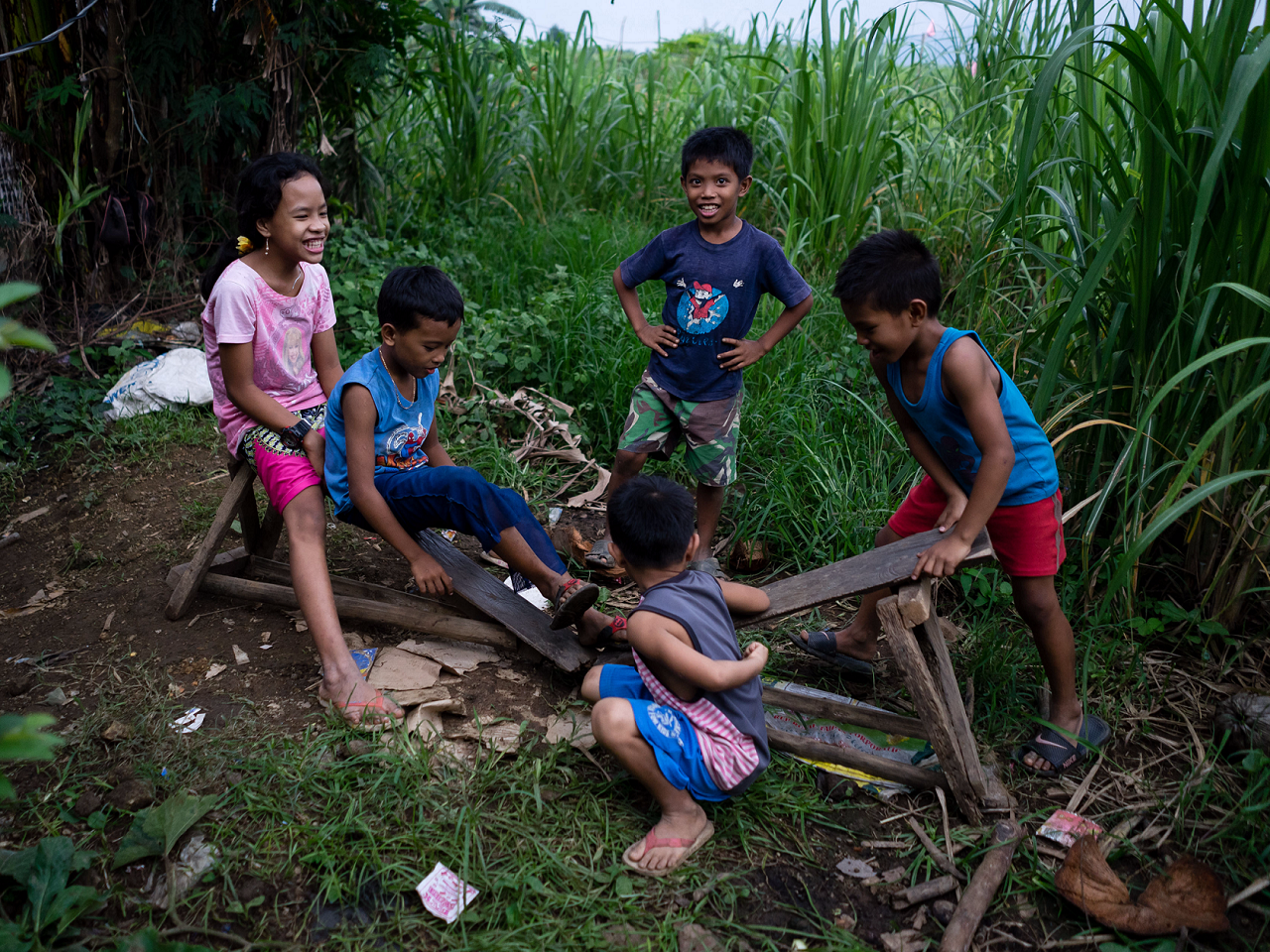
ORO AND TOPER SHARE THIS BURDEN with their parents. Boys here start earning a daily wage at 13 or 14 years old. Agricultural work, particularly in sugarcane plantations, can be considered one of the “worst forms of child labor” as defined in International Labor Organization Convention No. 182.
The agreement, of which the Philippines is a signatory, calls for the prohibition of “work which, by its nature or the circumstances in which it is carried out, is likely to harm the health, safety or morals of children.” It is not uncommon for workers here to hurt or injure themselves, especially during harvest season when big bundles of sugarcane are cut and loaded into trucks.
Oro responds with a shrug when I tell him this. After all, out here, more hands mean more income for a household, and everyone is just glad to help.
But for all this hustle — morning and afternoon, in plantations and construction sites, doing all sorts of jobs from selling rice cakes, rags, or peanut butter to doing laundry to hauling goods to chasing some other odd job here and there — generation upon generation of Filipino farmers remain desperately poor.
Today at the plantation, each laborer will take home P250 (US$4.7), an average rate, and far below the minimum wage of P317.50 (US$6) for plantation workers in Nasugbu. And because work isn’t necessarily available every day, a typical household here only earns around P3,000 to 4,000 a month (US$ 56-75), and even less during Tiempo Muerto.
THE MOST SENIOR MEMBER OF THE GROUP in the plantation today is Sonny Roxas, who still does the backbreaking work at age 57. He is also the president of the Pagkakaisa Ng Manggagawang Bukid Sa Tubuhan Sa Batangas, a local organization of farm workers. Sonny has a somber face with deep set eyes, and a crown of salt and pepper hair.
He is missing a few teeth in his upper and lower jaw that, he says, were knocked out of his mouth after being violently punched in the face by a soldier at a military base, where their organization was holding a protest rally a few years back (a story we could not verify independently).
Sonny speaks softly but deliberately.
“Ang manggagawang bukid parang trabahong hayop, trabahong kalabaw, para kayo ay makaraos. Kapalit nun yung talagang napakaliit at hindi sapat na sahod, sa biglang sabi sahod na nakakamatay eh, kasi hindi talaga makakasapat para makabuhay ng isang pamilya. Pero sa kagaya namin dito sa kabukiran, wala kaming ibang option. Hindi naman kami nakapag-aral at hindi kami makasapat sa pamantayan para matanggap sa mga pagawaan,” he says.
(“Farm workers toil like animals, like beasts of burden, just to survive. In return, they get a tiny salary, not a living wage but more of a death wage, because it simply isn’t enough to support a family. We don’t have any options either. Most of us weren’t able to study, and also can’t satisfy the requirements to work in a factory.”)
This hand to mouth existence leaves farm workers extremely vulnerable to the cruel twists of fate. Earlier this year, Oro’s younger brother, Emerson, borrowed a motorcycle to go to school. He was going to audition for a role in a play and didn’t want to be late. In his rush, the 16-year-old lost control at a curved section of the road and crashed into a tree. He wasn’t wearing a helmet. Emerson died in the hospital three days later.
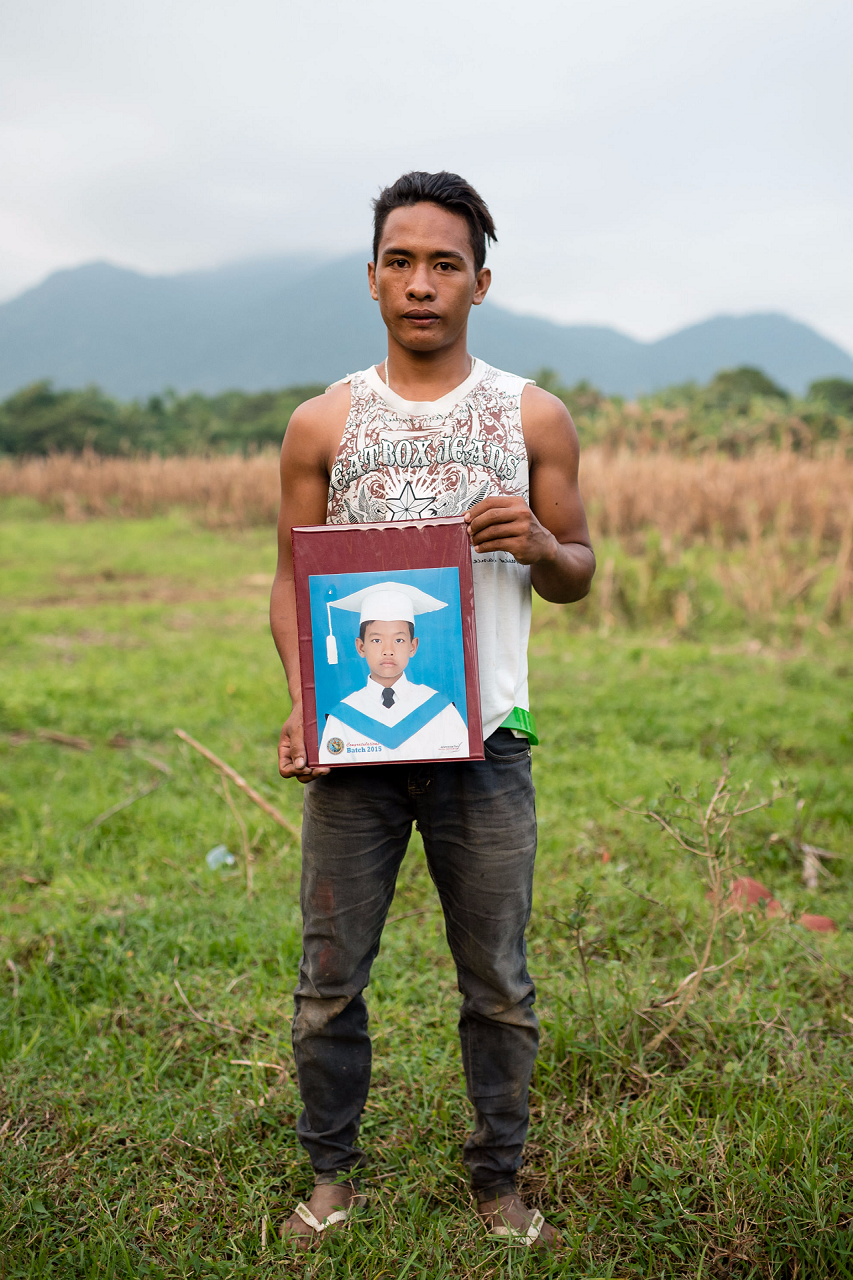
ORO’S GRIEF REMAINS PALPABLE as he recounts the tragedy, tears welling up in his eyes. Emerson was a smart kid, he says, one of the top of his class, and a reliable hand in the plantation as well. He was far too young, and had big dreams ahead of him, Oro laments.
But the accident also left the family with a staggering debt. Four months on, they are still paying for the hospital bill, funeral services, and even the borrowed motorcycle that was damaged beyond repair.
“Magkano lang po ba ang kita namin? Hindi naman kami makatrabaho sa tubuhan noon,” Oro says. “Kaya ang nanay ko nagtitinda ng basahan. Tutubuan ng konti lang para maubos. Tapos pamasahe pa ulit. Kulang, kaya uutang na naman kami.”
(“How much do we earn? We couldn’t work in the plantations back then. My mother sold rags, but the margins were small just so she can sell everything. And we still have to pay for transportation. It’s not enough, so we have to borrow money again.”)
SOMETIMES, THE FAMILY JUST COULDN'T SEEM to catch a break. Toper had been saving up for a motorbike himself, a handy possession in the vast plantation. So he started to save some P20 to 30 (US$0.37-0.56) a week, placing the bills inside plastic straws to waterproof them and sticking his loot in a large plastic mineral water bottle.
His brother-in-law told him to bury the bottle somewhere secret with just the cap exposed, and a mound between a clump of banana trees seemed perfect to Toper: a literal savings bank.
With some discipline, his treasure began to add up to around P500 (US$9.6), a small fortune for the young man. But then, disaster struck.
“Nawala ho bigla, hindi ko alam kung saan napunta. Hinayaan ko na lang po. Tsaka sabi ko kung nakanino man po yun eh bibigay ko na lang po. Baka po kasi nangangailangan siya o may babayaran,” Toper says, with no hint of bitterness in his voice.
(“It just disappeared. So I let it be. I’ll just give it to whoever has it. Maybe they need it more than me.”)
Many of the students at Toper’s high school are like him, seasonal farm workers who go to class on weekdays and work in the fields on weekends or whenever they can manage. In Batangas, the practice is so prevalent that they even have a word for it: maghuhurnal, an agricultural laborer who gets paid by the day.
At lunch in their school canteen, Toper considers his choices carefully. A meal of rice and a hotdog costs P23 (US$0.4). Check.
In the past, he would treat himself to a pack of fruit drink, sold at P10 (US$0.2), every now and then. However, a recently implemented tax on sugar products have caused prices to spike. Now, the same drink costs P12 (US$0.22). That extra P2 (US$0.04) causes a seismic shift in Toper’s budget, denying him a simple pleasure.
“Malaking bagay po yun. Yung mga piso po kasi pwedeng ipunin, pwede pong malagay sa mga kulang na pera,” Toper says.
(“It’s a big deal. Small change can add up in case I need it.”)
The situation drips with irony: the sugar plantation worker who breaks his back toiling the field could no longer afford his sugary treat.
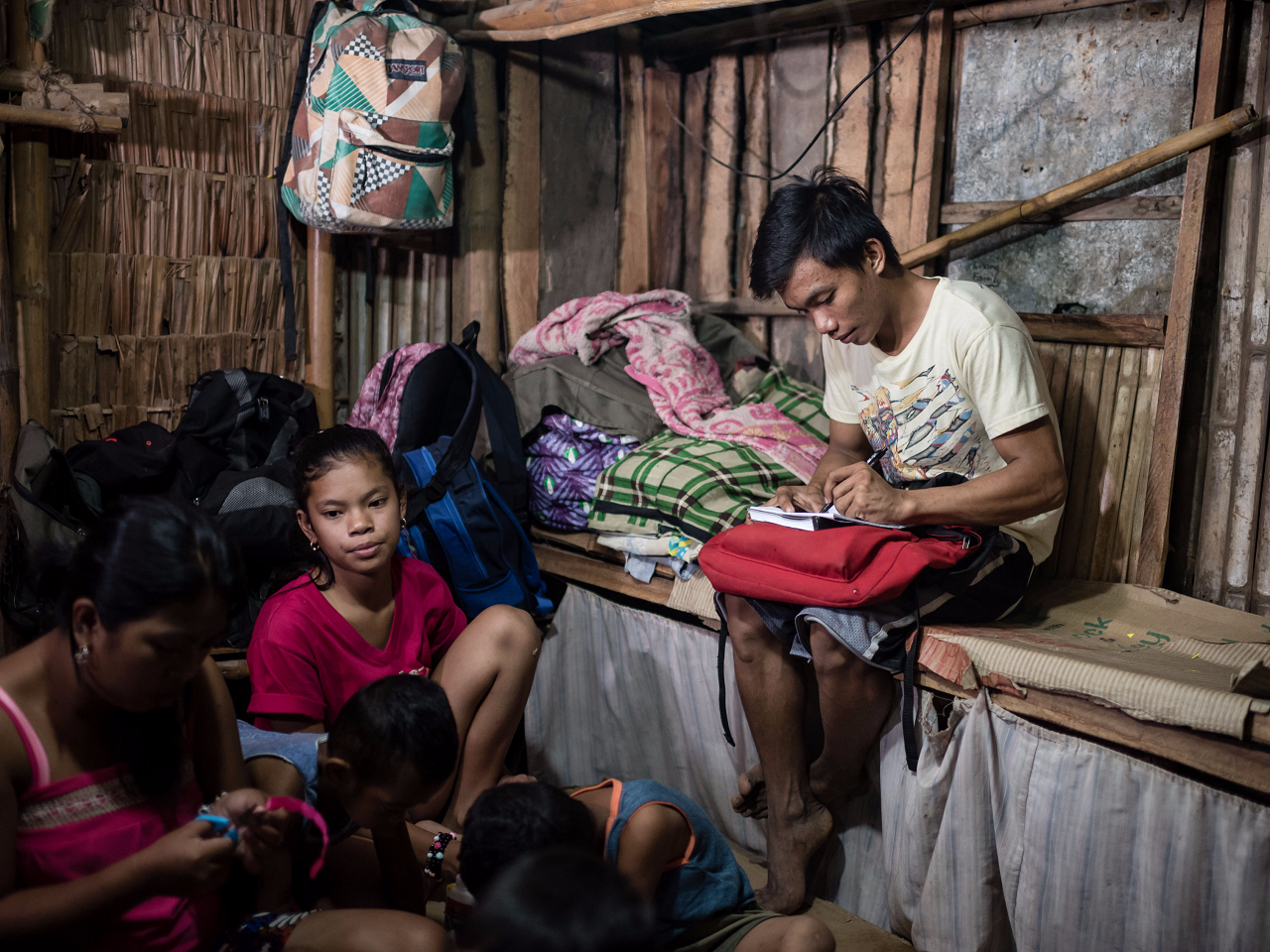
EVEN WHEN THEY ARE ABLE to protect their savings, sugarcane workers are being robbed in more insidious ways.
The plight of Oro and Toper is certainly not unique to this region. Throughout the Philippines, agricultural workers remain some of the poorest members of society. It is rooted in a more fundamental problem: persistent landlessness among farmers.
The 1988 Comprehensive Agrarian Reform Program or CARP under then president Corazon Aquino was supposed to rectify this universally recognized social injustice. The program was extended for another five years in 2009 through the Comprehensive Agrarian Reform Program Extension with Reforms (CARPER), until it finally expired in June 30, 2014.
Yet, on the 30th anniversary of its implementation, the promise of agrarian reform appears unfulfilled for many. According to the peasant organization Kilusang Magbubukid ng Pilipinas, seven out of 10 farmers in the Philippines still work on lands they do not own.
The reasons for the perceived shortcomings of CARP are diverse. On one hand, powerful landowners resisting land reform have the resources to bring disputes to court, where some cases remain unresolved. There is also the issue of land use conversion: changing the classification of agricultural land in order to escape distribution. Survey issues, problematic titles and documents, deceit and coercion —the obstacles often appear innumerable.
And as Sonny explains, even when farmers receive their Certificate of Land Ownership or CLOA, the alleged lack of support services renders agrarian reform impotent in many cases.
“Paano pakikinabangan at anong silbi ng programa? Sasabihin idi-distribute, ipapamahagi yung lupa sa mga magsasaka. Eh ang ibibigay lang ay papel,” Sonny says.
(“What use is the program to us? They said they would distribute the land to farmers, but all they handed out was a piece of paper.”)
Comprehensive Agrarian Reform Program (CARP), passed in 1988, was supposed to rectify persistent landlessness among farmers. The program was extended for another five years in 2009 through the Comprehensive Agrarian Reform Program Extension with Reforms (CARPER). Yet, on the 30th anniversary of its implementation, the promise of agrarian reform appears unfulfilled for many.
The Department of Agrarian Reform admits that the CARP has some deficiencies, but insists it also has its share successes. Based on their records, about 4.8 million hectares have been awarded to 2.7 million Agrarian Reform Beneficiaries (ARB) since CARP’s implementation.
Undersecretary Luis Pañgulayan says this has improved the lives of some farmers, particularly those organized under cooperatives, but admits this accounts for only 14 percent of ARBs.
Pañgulayan also acknowledges that in many cases, poor farmer beneficiaries are forced to cede use of their land back to their landlord because of the lack of support and options. The transaction is called aryendo or renting, and is considered illegal under Agrarian Reform Law for the protection of ARBs. But many are desperate.
“Tatanggap na lang siya ng halaga, maliit na halaga na hindi po sapat para sa kaniyang pangangailangan. Bakit po pumapayag yung magsasaka? Kasi po kulang ang pagsuporta siguro ng estado, siguro po kulang yung support services na nabibigay natin,” Pañgulayan says.
(“They are willing to accept a small amount [to rent out their land], an amount so small that it really isn’t enough for their needs. Why do they agree to this? Maybe because state support is lacking. Perhaps our support services are inadequate.”)
As for the relatively simpler issue of minimum wage and working conditions, the Department of Labor and Employment (DOLE) says they are ever ready to respond to complaints.
“Kung may allegations po ng mababang uri ng occupational safety and health standards like yung dwelling facilities nila at yung wage nila ay below minimum, kailangan po maipaalam kaagad sa ating regional offices para maicorrect po ito ng employer,” says Karen Perida Trayvilla, director of the DOLE Bureau of Workers with Special Concerns.
(“If there are allegations of poor occupational safety and health standards, for example in their dwelling facilities, and if their wage is below minimum, they have to inform the regional offices right away so the employer can make corrections.”)
These words offer little comfort for Sonny, who says they have not been remiss in seeking redress from government or making their voices heard. Decades of experience with the peasant movement has only hardened his resolve to rely on the strength of their ranks instead. Although the glaring hardships of farm workers here might be enough to account for his healthy skepticism of institutions, I try to probe a little deeper to see where all this mistrust was coming from.
THERE IS A CHINK IN HIS ARMOR of stoicism, and Sonny’s stern demeanor changes when he recounts a bitter childhood experience.
He couldn’t remember the exact day it happened, but he knew it was a Friday, because that was when cows were sold at the local market in Padre Garcia town. It had also been raining. Sonny was only nine years old at the time and lived in neighboring San Juan, Batangas, a family of farm workers trying to scrape by like everyone else.
His father’s job was to buy cows in the market, a mangangalakal, but he had somehow displeased someone powerful. Falsely accused of stealing, he was arrested, and failed to come home on that rainy Friday.
By the next morning, he was dead. His killers were never brought to justice.
Sonny says his fondest memory of his father is riding on his shoulders as he walked across the countryside after a day at work. Sonny was his favorite, or at least that’s how it felt like. His voice is trembling now as he tells the story, his breath, short and constrained.
“Doon ko po nakita yung hirap... 'yung parang aping-api... pasensya na po,” Sonny pauses. “Yung naramdaman namin, kapag wala kayong pinag-aralan, kung ano pala ang gusto ng mas nakakaangat pwedeng gawin, pwede kayong patayin ng walang kadahi-dahilan. Yung trauma ho sa amin, sa akin, hanggang ngayon po parang isang hindi mawala.”
(“That was when I realized how hard it was... to be so insignificant and oppressed... I’m sorry. I felt that if you had no education, you were completely at the mercy of powerful people, they could kill you for no reason at all. The trauma is still with me to this day.”)
AS THE SCHOOL WEEK ENDS, Oro and Toper spend another weekend working in the plantation. There is still singing, friendly banter, and the occasional water or coffee break in the shade. When the group is together, from the outside looking in, one might be fooled into thinking that life here isn’t bad at all.
A smiling Toper reveals a plan. He will try saving again. Maybe this time he will have enough to make down payment on a motorcycle. I gently cajole him to find a better hiding spot this time around.
Meanwhile, Oro, the boxer, had fighting words when asked about how he manages to stay strong amid all the hardship. “Pagtitiis lang po talaga at tiyaga ang kinakailangan, tibayan ang loob. Kung hindi titibayan ang loob talagang ikaw ay hindi aahon sa hirap. Diba po kapag may tiyaga naman may nilaga?”
(One just has to persevere, we just have to be strong. If you don’t pluck up your courage, you won’t be able to rise out of poverty. Isn’t it true what they say, with persistence comes reward?)
I return the question to him. Do you really believe that?
Yes, he tells me.
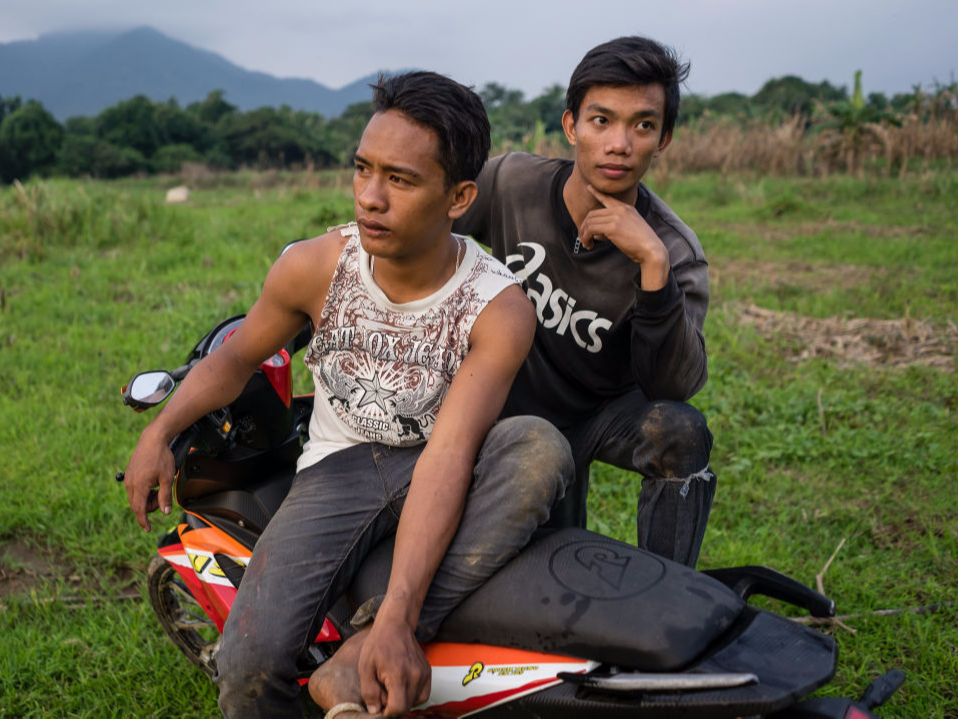
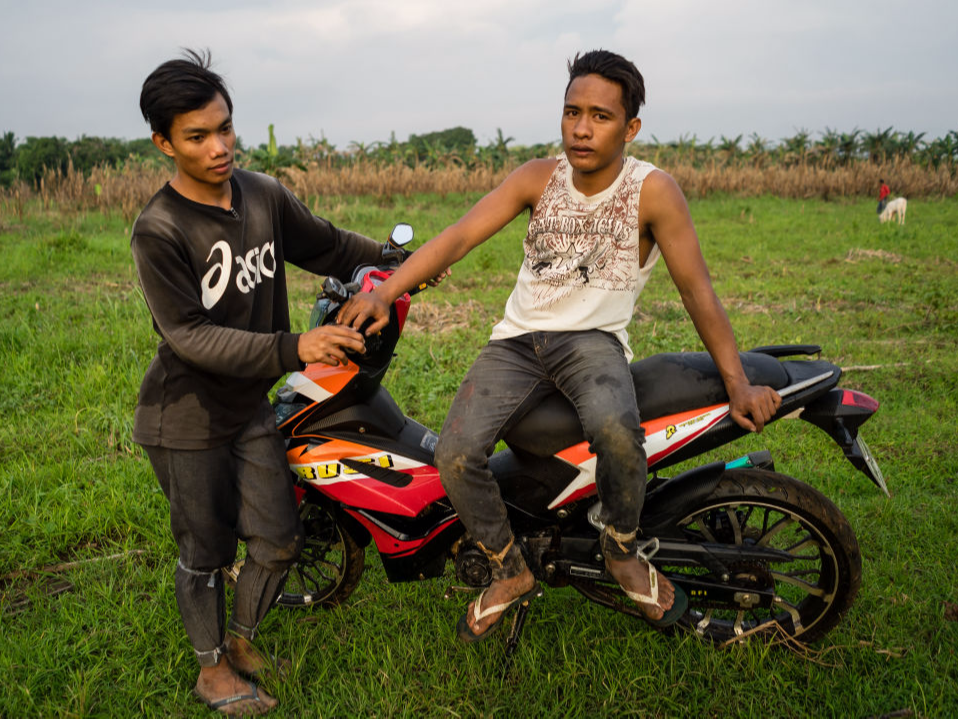
MAYBE THAT'S ALL IT TAKES. Or maybe that’s all they have: an unwavering belief that things will get better, that ultimately, fortune favors those with grit and determination. Maybe it isn’t fortune either, but some kind of divine justice.
Again, it is Sonny’s outlook that resonates: “Kahit gabundok pwede mo 'yan patagin, sa bawat araw makakatipak ka ng kapiraso diyan, mapapatag mo yan. Huwag mong titigilan, ganoon po ang prinsipyo ko sa buhay. Sino ba ang hindi naghahangad na magkaroon ng sariling lupa, sino ang hindi naghangad na makuha ang kaniyang mga biyaya sa paggawa. Kung 'yan ay gagawin mo ng matapat, hindi mo gagawin na tuntungan para sa iyong sariling interes, mangyayari at mangyayari 'yan.”
(“Even a mountain can be leveled, you just have to break off a small piece everyday. Don’t give up, that is my principle in life. Who wouldn’t want to have a piece of land that’s rightfully theirs? Who wouldn’t want to enjoy the fruits of their own labor? If you do things with integrity, and not as a platform for self-interest, it will happen.”)
In the distance, smoke billows over the Central Azucarera, and the wheels of the unrelenting machine keeps on turning.
Share This Story